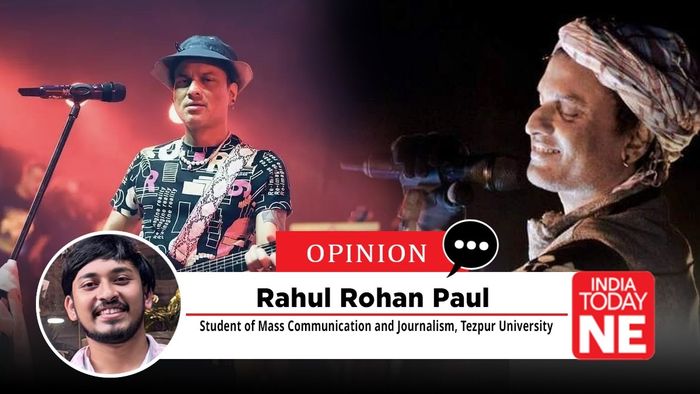Rhythms of Bohag: How Zubeen Garg Shaped Assam’s Bihu Spirit
Zubeen’s involvement with Bihu was not incidental. He saw the festival not just as another show but as a cultural heartbeat. He sang Assamese hits that found their way into every camp, every stage, every courtyard

- Nov 16, 2025,
- Updated Nov 16, 2025, 3:41 PM IST
When the drums of Bohag Bihu begin to beat across Assam, when the fields turn golden and the air hums with dhol and pepa, there is one voice that has come to define that moment for so many that is of Zubeen Garg’s. His songs did more than fill sound systems. They filled hearts, shaped celebrations, and became parts of the ritual itself.
Zubeen’s involvement with Bihu was not incidental. He saw the festival not just as another show but as a cultural heartbeat. He sang Assamese hits that found their way into every camp, every stage, every courtyard. Songs like Hiya Diya Niya, Jaanmoni, Buku Duru Duru, Mayabini Ratir Bukut, O Mor Mon, Anamika, Ringa Ringa Mon, and his lighter Bihu-style numbers became staples during Bihu nights and day-long celebrations. His catalogue contains dozens of folk-tuned melodies that people wait for every spring.
His Stances During Bihu — Why He Was Different?
One of the reasons Zubeen became the soul of Bihu was the way he carried the festival’s spirit beyond music. Year after year, he used Bihu stages to speak about Assamese identity, unity, cultural preservation, and social responsibility. His words were not scripted. They came from an emotional place that the public felt instantly.
He often reminded organisers that Bihu was not a competition of lights and loudness but a festival of community. He urged committees to keep platforms free for young artists, to ensure traditional performers were given respect, and to safeguard the authenticity of folk dance and music. Many remember his heartfelt appeals to keep the festival clean from unnecessary commercialisation. He reminded crowds that Bihu was not simply entertainment it was a heritage that must be protected.
There were moments when he paused mid-performance to speak about environmental care, especially during Rongali Bihu where open spaces, fields and natural surroundings are central. He encouraged people to plant saplings during Bohag Bihu, calling it “a gift to thenext season of Assam.” These gestures solidified his role not as a performer, but as a guardian of the festival’s soul.
How He Made Bihu an Unforgettable Experience
A Zubeen Garg performance during Bihu was not just a show. It was an atmosphere. People travelled from villages, towns, and neighbouring districts simply to watch him live. Once he stepped on stage, something shifted the crowd energy rose, and Bihu became more than a celebration. It became emotional memory. He had an unmatched ability to blend modern sound with the folk rhythms of dhol, taal, toka and pepa. His “Hoi Hoi” calls became so iconic that they became part of the festival’s soundscape. When he performed Bihu Xongkha, Deori Deori, or any folk-infused song, he invited audiences to sing along until the whole venue vibrated like one heartbeat. Children sat on shoulders, elderly people smiled with nostalgia, and youths danced till late hours because when Zubeen sang, Bihu felt like family.
People still talk about the nights when he extended performances beyond scheduled hours because the audience did not want him to leave. He would often switch between slow nostalgic tunes and electrifying Bihu beats, creating a flow that only he could maintain. The magic was not in the playlist. It was in the sincerity of his presence. For many youths, their first memory of attending a late-night Bihu function includes a Zubeen stage, a sea of glow from phones, and countless voices singing along as if the night would never end.
In recent months, following his passing, multiple Bihu committees have made profound decisions. The Beltola Bihu Festival Celebration Committee in Guwahati announced that it would cancel its annual Bohag Bihu 2026 celebrations as a mark of respect to Zubeen. Community after community has chosen not to proceed with the usual fanfare, saying Bihu without Zubeen’s voice would feel incomplete.
What does that mean for Assam? It means that the festival, which has always been timeless and communal, now carries a different texture. The dances will swirl, the drums will roll, but somewhere the absence of that familiar voice will be felt. Zubeen’s songs did more than entertain. They preserved folk rhythms, bridged modern production with traditional heart, and brought Bihu into popular culture without diluting its essence. He recorded not simply party tracks, but tunes that people sang at home, on the way to work, in the fields. In doing so he became part of the festival’s identity.
The Bihu that follows now will feel different. Not because the joy is lost, but because the meaning is deeper. Songs will carry more weight. Celebrations will carry more remembrance. Zubeen may no longer be on stage, but his voice will still hover over the fields, the dhol beats, and the rising sun of Bohag. And that is his real contribution. Making a festival feel like home. Making a celebration feel like heritage. Giving a generation songs they will sing long after the drums stop.